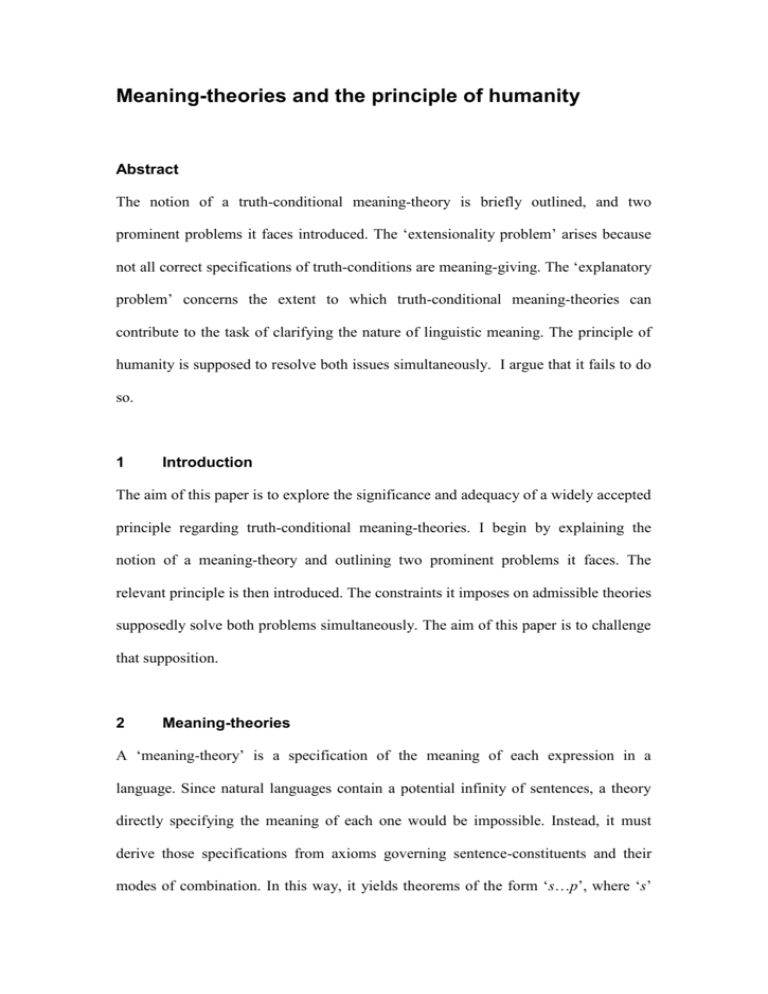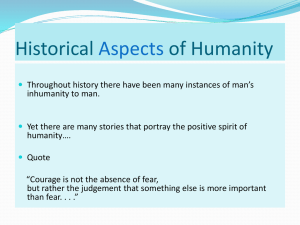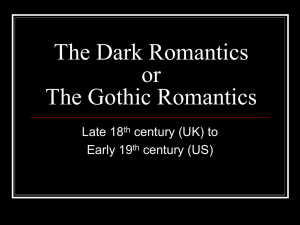Meaning-theories and the principle of humanity
advertisement

Meaning-theories and the principle of humanity Abstract The notion of a truth-conditional meaning-theory is briefly outlined, and two prominent problems it faces introduced. The ‘extensionality problem’ arises because not all correct specifications of truth-conditions are meaning-giving. The ‘explanatory problem’ concerns the extent to which truth-conditional meaning-theories can contribute to the task of clarifying the nature of linguistic meaning. The principle of humanity is supposed to resolve both issues simultaneously. I argue that it fails to do so. 1 Introduction The aim of this paper is to explore the significance and adequacy of a widely accepted principle regarding truth-conditional meaning-theories. I begin by explaining the notion of a meaning-theory and outlining two prominent problems it faces. The relevant principle is then introduced. The constraints it imposes on admissible theories supposedly solve both problems simultaneously. The aim of this paper is to challenge that supposition. 2 Meaning-theories A ‘meaning-theory’ is a specification of the meaning of each expression in a language. Since natural languages contain a potential infinity of sentences, a theory directly specifying the meaning of each one would be impossible. Instead, it must derive those specifications from axioms governing sentence-constituents and their modes of combination. In this way, it yields theorems of the form ‘s…p’, where ‘s’ Meaning-theories and the principle of humanity names a sentence and ‘p’ somehow gives its meaning. The orthodox version of this proposal is that axioms should generate specifications of the form: (T) s is true iff p So, for example, from: a) ‘snow’ stands for snow b) ‘x is white’ is satisfied if and only if x is white one can generate the theorem: 1) ‘Snow is white’ is true iff snow is white and treat (1) as if it stated what the sentence means. The presumed advantage of this approach is that it is extensional, and so avoids the (supposed) obscurity of intensional notions that presuppose, or are just too similar to, that of meaning. A ‘theory of meaning’, in contrast, is an elucidation of the concept of meaning, or an attempt to clarify the nature of meaning. Not all advocates of meaning-theories assume that they will contribute at all to the theory of meaning; many see the two as distinct projects. Nevertheless, several prominent proponents think otherwise. Davidson, for example, hopes to answer the question, ‘what is it for words to mean what they do?’1 McDowell suggests that reflection on the form and purpose of meaning-theories will ‘remove all perplexity about the nature of meaning in general’.2 Likewise, Wiggins talks of achieving an ‘elucidation of meaning’, of showing ‘how meaning is possible’.3 So, while not all meaning-theorists are concerned with the difficulties raised above concerning our pre-theoretical notion of meaning, some certainly are. 1 2 2001a p.xv. 1998 p.3. 2 Meaning-theories and the principle of humanity Reflection on meaning-theory construction supposedly contributes to, or constitutes, theory of meaning in the following way. If one could construct an apparatus for providing specifications of meaning, without actually employing the recalcitrant notion itself or any cognate, one would show meaning to be unproblematic. Furthermore, by reflecting on what a theory would have to be like in order to count as meaning-giving, insight is gained as to the nature of linguistic meaning.4 3 The extensionality and explanatory problems A well-noted problem5 with truth-conditional theories is that not all correct specifications of truth-conditions will be genuinely ‘interpretative’ or meaning-giving. For example, the following is a true T-sentence, but it does not give the meaning of the sentence: 2) ‘Snow is white’ is true iff grass is green The problem is that truth is an extensional notion, whereas meaning is intensional. As Wiggins says, in order for the theory to be genuinely one of meaning, some interpretations have to be ‘privileged’ at the expense of others.6 (I shall use the label ‘T-theory’ to refer to a true truth-characterisation for which it is not yet determined whether it is meaning-giving.) Several responses have been made to this problem, and their shortcomings effectively highlighted by others.7 I shall focus only on the appeal to the principle of humanity, which has not yet received much critical attention. Before doing so, however, I shall 3 1997 pp.19, 21. Cf. Davies 1981; Dummett 1996; Foster 1976. Davies 1981 p.38; Foster 1976 p.4. 5 For a representative sample, see Davies 1981 pp.27-8; Evans and McDowell 1976 p.xiii; Foster 1976 pp.14ff; Horwich 2002 p.79; Larson and Segal 1995 pp.32ff; McDowell 1998b p.60; Platts 1997 pp.60ff; Wiggins 1997. 6 1997 p.6. 4 3 Meaning-theories and the principle of humanity discuss an additional matter concerning the extent to which reflection on meaningtheories can contribute to the theory of meaning. Dummett expresses the following concern about a meaning-theory that generates specifications of the meaning of sentences by way of specifying their truth-conditions: it simply takes for granted what it is for primitive expressions of a language to have the semantic powers they do. Correspondingly, the theory (in its axioms and theorems) merely states what is known by a competent speaker, the object of knowledge, not in what that knowledge consists. Surely, Dummett insists, philosophy demands a more illuminating account of what it is for such signs to have the significance that they do, and what it is to grasp that significance.8 Strawson raises a related concern. The central notion of Davidson-style meaningtheories is that of truth. But, Strawson says, we: cannot be satisfied that we have an adequate general understanding of the notion of meaning unless we are satisfied that we have an adequate general understanding of the notion of truth.9 Now, he points out, it is a platitude that the utterance of a sentence is true if and only if things are as that utterance states them to be. So the notion of truth is linked to that of the content of an assertion. Therefore, to understand the nature of meaning properly, via truth-conditions, one must in turn consider the assertional significance of a given expression, and thereby the aim of making a claim. For an excellent critique of Davidson’s appeals to compositionality, nomologicality, and charity, see Fodor and Lepore 1992 chapter 3. 8 1991 pp.104ff; 1996 essays 1 and 2. 9 2001 p.138. 7 4 Meaning-theories and the principle of humanity Both Dummett and Strawson are challenging the extent to which meaning-theories that generate specifications of truth-conditions can contribute to the task of illuminating the nature of meaning. I shall call this ‘the explanatory problem’. 4 The principle of humanity In this section, I shall sketch a way of conceiving truth-conditional meaning-theories, recommended most forcefully by McDowell, which supposedly addresses both problems. Crucially, it still recommends that the T-theory itself be austerely extensional, that it not involve concepts too closely linked to that of meaning.10 According to McDowell, the axioms assigning semantic powers to primitive expressions and the specifications of truth-conditions are not to be viewed as independently intelligible. On the contrary, both get certified as such only by interacting with a theory specifying what kind of speech-act is being performed. And all are in turn certified as such by contributing to the more general task of making sense of practitioners in the light of their psychological attitudes and facts about their behaviour and environment. So, there is no suggestion that the truth-conditions of sentences or the significance of sentence-constituents be understood as such prior to viewing them as contributing to the contents of utterances, which are in turn embedded in a wider project of comprehending language-users.11 Crucially, McDowell does not think that the notion of truth-conditions (and so meaning) can be accounted for, via the notion of a communicative act, in terms of speakers’ intentions (or any psychological attitude), where the latter are conceived of 10 11 McDowell 1998b pp.4-5; Wiggins 1997 p.16. McDowell 1998b pp.4-7, 24, 62, 145, 172, 196-7, 316ff; cf. Evans and McDowell 1976 pp.xvi-xviii. 5 Meaning-theories and the principle of humanity as something on which one might have an independent purchase. Rather, the various facets are to be viewed as parts of a holistic whole, each held in place by the other. By so describing the purpose and significance of meaning-theories, the explanatory problem is supposedly met. The relevant notions – truth, assertion, belief, desire, etc – are purportedly given their sense and status by one another and their place in the general scheme drawn upon in making rational sense of agents. That is, by appreciating the requirements on any theory that is to qualify as one of meaning, one comes to appreciate the link between ascriptions of truth-conditions, of speech-acts, and of psychological attitudes. Thus, Wiggins tells us, this construal helps to shows ‘how it is possible for there to be such a thing as the semantical, and on what conditions it is possible, namely the existence of both the compositional (in the small) and the social (in the large)’.12 In addition, this construal purportedly blocks the extensionality problem. By requiring that T-theories contribute to making sense of practitioners, non-meaning-giving theories are ruled out, since they will not be of assistance in rendering them suitably intelligible. Imagine, for example, choosing between theories that generate the following specifications: 3) ‘The house needs painting’ is true iff the house needs painting 4) ‘The house needs painting’ is true iff the earth moves If a speaker utters, ‘The house needs painting’ when stood in front of her dilapidated home, looking at its flaking surface, and holding a bucket of paint, one can rule out 12 1997 p.21. 6 Meaning-theories and the principle of humanity (4) on the grounds that it does not contribute to the task of ascribing intelligible psychological attitudes to her. Call the requirement that T-theories facilitate the ascription of intelligible psychological attitudes to those interpreted the ‘principle of humanity’ and theories subject to it ‘humanitarian’.13 That its constraints solve the extensionality problem is accepted by a number of prominent philosophers.14 That it adequately meets the explanatory problem is likewise widely assumed.15 In the sections that follow, I shall challenge both contentions. 5 Is the explanatory problem solved? In this section, I shall consider whether the humanitarian construal of meaningtheories divests them of their potential to shed light on meaning. The focus here, then, is the explanatory problem and the extent to which meaning-theories contributes to the theory of meaning. Recall that a motivation for recommending reflection on meaning-theories is that the notion of meaning seems, when one reflects upon it, problematic. Constructing an extensional surrogate that corresponds to that notion, and considering what constraints it is to be subject to, promises (according to its advocates) to show meaning to be less puzzling. One might justifiably wonder, however, just how philosophically illuminating a humanitarian meaning-theory is going to be. True, as Wiggins says, the notion of making sense of practitioners is not specifically semantic but has broader 13 See Grandy 1973. See Davidson 2001a pp.xix, 176; Dodd 2000 p.46n5; McDowell 1998b p.8n15; Miller 1998 pp.266ff; Platts 1997 pp.65ff; Thornton 2004 pp.116ff; Wiggins 1997 pp.18-19 and 1998 pp.111-3, 145-6. 14 7 Meaning-theories and the principle of humanity application.16 Nevertheless, the theorems a meaning-theory generates, and the axioms it includes, are only certified as such by appeal to notions like belief, intention, and desire. Surely these concepts are simply too close to that of meaning in the relevant respects, equally problematic or just as in need of elucidation. The appeal to psychological considerations that constitutes the principle of humanity simply takes for granted an adequate grasp of certain intensional, intentional (and in the case of mental content, semantic) notions. It is, then, far from clear to what extent any theory subject to the constraints will contribute to clarifying the nature of meaning. Crucially, the objection is not that humanitarian meaning-theorists are trying to give a reductionist explanation of meaning in psychological terms, and that such an explanation is not possible. On the contrary, those theorists are clearly united in thinking that such an account is neither feasible nor desirable.17 And the claim is not that humanitarian meaning-theorists ought to provide a reductionist explanation but refuse to do so. On the contrary, the presupposition that all genuinely illuminating philosophical accounts provide a story in independently intelligible and more basic terms is one that can and should be challenged. Nonetheless, humanitarian meaningtheorists are trying to elucidate the notion of meaning by reference to psychological concepts. What is sought is an account that actually assists us in arriving at a theoretical appreciation of a concept of which we have a pre-theoretical understanding, namely meaning, and it is obscure how this is achieved by uncritical 15 In addition to McDowell and Wiggins, see also Platts 1997 pp.58ff; Thornton 2004 p.119 1997 p.18. 17 see, e.g., Evans and McDowell 1976 p.xvi; Davidson 2001a p.143; Platts 1997 pp.89ff. Obviously, there are many meaning-theorists who do view the semantic as derivative from the psychological (e.g. Larson and Segal 1995). I shall not argue against that view here, since the humanitarian meaningtheorists reject it. 16 8 Meaning-theories and the principle of humanity appeal to notions that share with that concept precisely those characteristics that were the original source of puzzlement (intentionality, intensionality, normativity). Consider the issue from a different perspective. If the T-theory itself cannot employ the notion of meaning, or any cognate, then there seems no principled reason for allowing in the set of constraints notions that are equivalent in all the relevant respects. This amounts to shifting the difficulty from one place to another, rather than genuinely tackling it. It is simply unclear how reintroducing the problematic features further down the line can serve to reveal them to be unproblematic. A humanitarian meaning-theorist would no doubt reject the objection as resting on a mischaracterisation of her position, and restate that there is no claimed order of priority. Our understanding of what it is for expressions to have the semantic powers they do is no more or less secure than that of the Verstehen they contribute to. As McDowell tells us, the meaning-theorist does not seek an analysis: of the notion of [meaning] in terms of other notions, still less any hope of reducing it to those others, but simply a description of its relation to those others; the hope being that a notion that is at first sight problematic may be rendered less so by an explicit account of its location, so to speak, in a conceptual space in which we normally find our way about without thinking.18 The charge, however, was not that the meaning-theorist treats psychological ascriptions as conceptually prior to semantic specifications but rather that neither is suitable for shedding light on the other, since they are just too similar, and so that conjoining truth-theories and psychological considerations is not going to aid us in securing a theoretical appreciation of meaning. In addition, a tension has been noted 9 Meaning-theories and the principle of humanity between the demand that intensional notions (such as meaning) be withheld from (and only from) the axioms and theorems of the T-theory, while equivalent notions are subsequently permitted in the specification of constraints. Furthermore, if, as the quote from McDowell suggests, conceptual geography is what is needed as regards the theory of meaning, and if it is the mapping itself rather than the axiomatic theory that is the source of illumination, what is to be gained by considerations of recursive truth-characterisations? One can map the pertinent concepts without recourse to the latter. Indeed, investigating the relations that various notions stand to one another, with the hope of highlighting their content and role, just is what is sought by certain kinds of conceptual analysis.19 An a priori demonstration that humanitarian meaning-theories will fail to relieve any felt puzzlement over meaning has not been provided. Something’s potential to achieve this cannot be decided in advance. Having said that, presumably one’s method should stand in some appropriateness relation to one’s problem; its capacity for elucidation should not depend on accident, revelation or brute force. So, if one recommends (as humanitarian meaning-theorists typically do) a non-reductionist approach, then one requires a cogent methodology. At the least, then, more needs to be said about how humanitarian meaning-theories are going to make a satisfactory contribution to the theory of meaning. The humanitarian meaning-theorist might respond that she need not treat psychological attitudes as utterly inexplicable; they may themselves be elucidated. 18 19 1998 p.7. Cf. Strawson’s notion of ‘connective analysis’ (1992 chapter 2). 10 Meaning-theories and the principle of humanity Further, she adds, it cannot reasonably be asked of her that she actually provide that elucidation; philosophical progress can only ever be piecemeal. That is true, but if direct elucidation of psychological notions is permitted and required, why not of meaning itself? Sainsbury astutely points out that, when reflecting on T-theories, ‘the whole burden of furthering our understanding of meaning in general is borne’ by the constraints imposed by such principles as that of humanity. And, he continues, this ‘would be just as good as an elucidation of what it is for a meaning-stating theory to be true’.20 That is, equally effective, for the theory of meaning, would be a theory whose specifications involve locutions such as ‘means’, and is accompanied by an account of what it is that such specifications specify. Indeed. And I would add that this in turn has no clear benefits over a direct investigation of the notion of meaning itself, without recourse to a meaning-theory at all. If the entire explanatory burden, as far as meaning is concerned, falls on the principle of humanity, then the initial consideration of T-theories has no clear advantages over immediate analyses of the behaviour of and connections between the relevant concepts as far as the theory of meaning is concerned. So, to summarise, the approach recommended by the humanitarian meaning-theorist could take one of two forms. First, it might involve an uncritical appeal to and dependence on psychological notions. But this is surely unsatisfying and of no help in illuminating the nature of meaning. Second, the project might come with a promise to 20 1980 p.13; cf. Davies 1981 pp.37ff. 11 Meaning-theories and the principle of humanity elucidate in turn those psychological notions and in particular their relation to meaning. However, one is then entitled to ask what reason there is to take this mediated route – from truth-characterisations to the principle of humanity and finally back to meaning again – rather than immediately investigate the concept of meaning itself, its function, relations and characteristic uses. The humanitarian meaningtheorist has yet to give a good explanation of why the former is preferable, when the latter seems eminently more sensible. 6 The compositionality constraint I suggested that, for the purposes of the theory of meaning, directly investigating the concept of meaning itself would be more effective than coupling T-theories with the principle of humanity. One claim often made on the behalf of constructing T-theories is that it accounts for the ‘productivity’ of language. That is, it displays how an infinity of meaningful sentences can be generated from a finite stock of constituents. However, a mere recognition of compositionality – the platitude that (whatever meaning is) what a sentence means is determined by the meaning of its constituents and how they are arranged – suffices to address this supposed puzzling feature of language. As Horwich says, one needs ‘merely assume that compositionality does hold. No explanation of why it holds is required’. That is to say, one does not need to provide an ‘explication of meaning’ in order to explain how the meanings of complex expressions are constructed from the meanings of their parts.21 So, compositionality alone does not explain why philosophers, when investigating the nature of linguistic meaning, need to reflect on what form a truth-conditional T-theory would take. 21 2002 p.80-4. 12 Meaning-theories and the principle of humanity Yet many hold that compositionality imposes substantial constraints on what qualifies as an acceptable conception of meaning. Fodor and Lepore, for example, claim that it ‘is the sovereign test for theories of… meaning’.22 There are, they suggest, a host of semantic features of complex expressions, most notably systematicity, that are presumed explicable by reference to facts about composition. Thus, to identify which theories of meaning pass muster, one must ask how the conceptions they provide can be employed in the construction of meaning-theories that accommodate these features. Adequately assessing the significance of compositionality is beyond the scope of this paper. However, one can note that claims of the kind made by Fodor and Lepore leave open the possibility that the basis on which the relevant conceptions of meaning are rejected can be appreciated quite independently of compositionality and the task of constructing meaning-theories, by direct consideration of the meaning-relevant features of complex expressions. Moreover, even if Fodor and Lepore are correct, it has no bearing on the qualms raised above specifically regarding the philosophical value of appealing to the principle of humanity. So, the claim that immediate elucidation is preferable to the meaning-theoretic route could be withdrawn without endorsing the appeal to the principle of humanity, which is the main concern of this paper. 7 22 Has the extensionality problem been solved? 2002 p.59. 13 Meaning-theories and the principle of humanity In this section, considerations of philosophical dividends will be set aside. Instead, I shall ask whether the constraints imposed by the principle of humanity are genuinely sufficient to block the extensionality problem. One is justified in complaining, I think, that many of the prominent humanitarian meaning-theorists have not elaborated adequately on just what constraints the principle imposes. McDowell, for example, vaguely talks of the need for the theory to ‘suitably’ or ‘acceptably’ license the ascription of psychological attitudes, which are to be ‘sufficiently intelligible’.23 This is no help since what one needs to know is precisely what counts as suitable, sufficient or acceptable. What is required, then, is a more explicit statement of the standard that T-theories, or the psychological ascriptions they facilitate, must meet. For present purposes, it is not necessary to fill in all the details, but only to ask what general shape it might take. Thus, I shall consider two broad ways of interpreting the principle, which I label ‘qualitative’ and ‘quantitative’. On a qualitative reading of the principle of humanity, a T-theory counts as correct (i.e. meaning-giving) if the psychological descriptions it assists one in providing are true. So, it is not enough that the attitudes ascribed have a certain amount of, say, reasonableness or intelligibility; they must actually be possessed by those interpreted. No doubt this would suitably limit admissible T-theories. However, as Davidson has argued persuasively, such ascriptions are not available prior to interpreting subjects’ utterances, at least for the kind of detailed attitudes a meaning-theory would need to 23 1998 pp.145, 172, 6 respectively. 14 Meaning-theories and the principle of humanity consider.24 There can be no determinate specification of what practitioners believe, desire, and so on, in advance of a specification of what their words mean. Assuming that one’s psychological description is correct cannot guarantee that a T-theory is genuinely interpretative since the former is itself only certified given the latter. The presence and content of beliefs, desires, intentions and the like cannot be determined in advance of the meaning of the corresponding expressions. If the principle of humanity requires that the psychological descriptions be true, or that the attitudes ascribed be genuinely those held, it effectively presupposes (rather than ensures) that the T-theory is meaning-giving. A qualitative reading of the principle of humanity, then, is not satisfactory. According to a quantitative reading of the principle, the constraints imposed do not state that the ascription of psychological attitudes a T-theory allows be correct. It is silent so far as the accuracy of the descriptions goes, and demands only that the attitudes ascribed have a certain amount of the relevant features (intelligibility, reasonableness). On this reading, then, a T-theory qualifies as meaning-giving if one cannot possibly increase those features (irrespective of whether the attitudeascriptions are correct). This escapes the problems associated with the qualitative reading, since there is no suggestion that the psychological description of practitioners be fixed prior to the certification of a meaning-theory as such. The problem with the principle of humanity interpreted in this way is that it is simply not the case that the constraints it imposes are strong enough to suitably restrict Ttheories. It will leave one with a range of competing theories, and no principled way 24 2001a essay 10. 15 Meaning-theories and the principle of humanity of choosing between them or privileging any as correct. I do not pretend to have a demonstrative proof that this will be the case but, to shift the burden of proof, there is nothing in the principle itself that guarantees a priori that this could not be the case. There is no apparent reason why there should not be a number of incompatible Ttheories, each of which permits specifications of equally intelligible and reasonable psychological attitudes. One can adduce additional considerations that support the denial that the principle of humanity – interpreted quantitatively – will be sufficiently restrictive. First, consider co-extensive but non-synonymous expressions. If desiring to eat renates makes sense, then desiring to eat cordates makes sense. The requirements enforced by the principle cannot, therefore, offer any means of adjudicating between T-theories that generate the following, manifestly non-synonymous specifications: 5) ‘Renates taste nice’ is true iff renates taste nice. 6) ‘Renates taste nice’ is true iff cordates taste nice. Second, as Davidson himself points out, one can always trade off belief against meaning so as to provide competing interpretations that equally well make coherent sense of practitioners in the light of their environment.25 The various psychological attitudes, together with the meaning of expressions and what is expressed by their use, form a holistic whole. There is simply no reason to doubt that a number of differing and putatively incompatible interpretations – which are equally effective in ascribing coherent attitudes and so revealing practitioners’ behaviour as intelligible – are available. 25 2001a p.139. 16 Meaning-theories and the principle of humanity Crucially, even if as a matter of fact the principle of humanity constrains the Ttheories for a given language to a single one, even if only that theory is plausible, this does not show that in principle non-meaning-giving T-theories will be ruled out. And so it does not demonstrate that the predicate characterised by humanitarian theories actually corresponds to that of meaning, rather than fortuitously (in a particular instance) coinciding with it. A second problem is that the principle of humanity might be uniquely satisfied by a given T-theory, which in fact generates false specifications of meaning. Surely it is possible for the description that attributes the most intelligible or coherent attitudes to practitioners to be incorrect, and likewise the theorems that license that description. Indeed, a common cause of misunderstanding is that one reaches for the most rational explanation. If this occurs locally, it is surely possible globally. This issue, then, is not whether the constraints imposed by the theory sufficiently restrict T-theories, but whether they suitably restrict them. If the principle allows false specifications of meaning then it is uncontroversially unacceptable. It is not really surprising that the principle interpreted quantitatively should have this consequence. Indeed, it practically entails it. If the accuracy of the psychological ascriptions is left open, then the accuracy of the corresponding T-theory will be likewise left open. Unless the humanitarian meaning-theorist can offer some a priori assurance that practitioners are always maximally reasonable or intelligible, it is not only possible but likely that the ascription of the most reasonable or intelligible psychological attitudes will be false. It is safe to assume that no such assurance is forthcoming. 17 Meaning-theories and the principle of humanity So, it seems that the humanitarian meaning-theorist is faced with a dilemma. On the one hand, any qualitative reading of the principle of humanity will simply presuppose (rather than guarantee) that permissible T-theories are meaning-giving. On the other hand, any quantitative reading will avoid this problem at the cost of failing to adequately restrict T-theories. Perhaps there are other ways of construing the principle that avoid these problems but the onus is on its advocates to show this. 8 Does the principle need to be uniquely satisfied? In response to the discussion of the principle of humanity quantitatively interpreted, one might argue that there is simply no need for the adduced constraints to be uniquely satisfied. Davidson, for example, readily admits that, even with something like a principle of humanity in place, it is likely that more than one T-theory will be counted permissible, but does not consider this a problem. Such a consequence would ‘not represent a failure to capture significant distinctions; it marks the fact that certain distinctions are not significant’.26 However, it has not yet been shown that the principle of humanity restricts T-theories to a range sufficiently narrow to find Davidson’s response reassuring, or the claim that the differences between them are insignificant plausible. Nevertheless, it is worth considering whether unique satisfaction is required. If it is, the case against humanitarian meaning-theories is further strengthened. 26 2001a p.154; cf. p.62. 18 Meaning-theories and the principle of humanity Adequately tackling these issues is beyond the scope of this paper. For present purposes, I shall confine myself to challenging Davidson’s stated reason for thinking that there is no need to provide constraints that are uniquely satisfied. He offers the following analogy: No one thinks the fact that we can register weight in either pounds or kilograms shows that there is something unreal about the weight of an object.27 Imperial and metric systems of weight offer alternative means of capturing the same patterns or ‘facts’. That those patterns or facts do not determine the applicability of a particular system of measurement does not cast doubt on those systems or on the genuineness of the features they pick out. However, this response is inadequate and fails to dispel the problem; it rests on a disanalogy. To say that an item weighs 0.4536 kilograms and also that it weighs 1 pound is not to make two incompatible claims. Indeed, there are tables available for converting the one to the other. In contrast, a T-theory that generates theorem (5) and another that generates theorem (6) are incompatible if viewed as specifications of meaning. The right-hand sides are manifestly non-synonymous. It may, of course, be true that, as Davidson suggests, the patterns of use that both pick out are, in one sense, the same, i.e. the two may be uttered in just the same circumstances. But in another, perfectly familiar and putatively legitimate sense, they pick out quite different patterns. One can be used to claim that renates taste nice, the other that cordates taste nice. The relevant patterns can be individuated more finely than Davidson supposes, and fine-grainedness is precisely what one would expect in matters of meaning. 27 2001b p.75; cf. 2001a pp.224-5. 19 Meaning-theories and the principle of humanity Davidson may, of course, be right that either theory is serviceable in describing, predicting and explaining the behaviour of practitioners, when the latter is conceived in non-semantic terms. But the concern is supposed to be with meaning, with a theory that serves to capture the semantic significance of their words. So long as that remains one’s aim, one cannot be content unless one’s constraints are uniquely satisfied by the appropriate, i.e. meaning-giving, theory. 9 Conclusion In this paper, I have considered the introduction of the principle of humanity in response to the explanatory and extensionality problems facing truth-conditional meaning-theories. I argued, first, that supplementing a T-theory with the principle is a barrier to shedding philosophical light on meaning, and second, that there is in any event no reason to think that the principle will appropriately restrict admissible Ttheories and ensure that the specification of truth-conditions is equivalent to one of meaning. Appealing to the principle of humanity provides a satisfactory response to neither the explanatory nor the extensionality problems. Granted, I have not provided a knock-down argument against that appeal, but at the least I hope to have undermined confidence in it and to provoke its advocates to enlarge upon their proposal. Daniel Whiting University of Reading, UK danieljwhiting@hotmail.com ldr02djw@reading.ac.uk 20 Meaning-theories and the principle of humanity Bibliography Davidson, D. 2001a: Inquiries into Truth and Interpretation 2nd ed. (Oxford: Oxford University Press) — 2001b: Subjective, Intersubjective, Objective (Oxford: Oxford University Press) — 2004: Problems of Rationality (Oxford: Oxford University Press) Davies, M. 1981: Meaning, Quantification, Necessity (London: Routledge) Dodd, J. 2000: An Identity Theory of Truth (Basingstoke, Hampshire: Macmillan Press) Dummett, M. 1991: The Logical Basis of Metaphysics (London: Duckworth) — 1996: The Seas of Language (Oxford: Oxford University Press) Evans, G. and McDowell, J. 1976: “Introduction” in Truth and Meaning G. Evans and J. McDowell, eds. (Oxford: Oxford University Press) Fodor, J. and Lepore, E. 1992: Holism (Oxford: Blackwell Publishers) — 2002: “Why Compositionality Won’t Go Away” in Meaning and Representation E. Borg, ed. (Oxford: Blackwell Publishers) Foster, J. A. 1976: “Meaning and Truth Theory” in Truth and Meaning G. Evans and J. McDowell, eds. (Oxford: Oxford University Press) Glock, H-J. 2003: Quine and Davidson on Thought, Language and Reality (Cambridge: Cambridge University Press) Grandy, R. 1973: “Reference, Meaning, and Belief” in Journal of Philosophy (70) Horwich, P. 1998: Meaning (Oxford: Oxford University Press) — 2002: “Deflating Compositionality” in Meaning and Representation E. Borg, ed. (Oxford: Blackwell Publishers) Larson, R. and Segal, G. 1995: Knowledge of Meaning (Cambridge, Massachusetts: Harvard University Press) 21 Meaning-theories and the principle of humanity McDowell, J. 1998: Meaning, Knowledge, and Reality (Cambridge, Massachusetts: Harvard University Press) Miller, A. 1998: The Philosophy of Language (London: The UCL Press) Platts, M. 1997: Ways of Meaning 2nd ed. (Cambridge, Massachusetts: The MIT Press) Quine, W. V. O. 1995: From Stimulus to Science (Cambridge, Massachusetts: Harvard University Press) Sainsbury, R. M. 1980: “Understanding and Theories of Meaning” in Proceedings of the Aristotelian Society (80) Strawson, P. F. 1992: Analysis and Metaphysics (Oxford: Oxford University Press) — 2004: Logico-Linguistic Papers 2nd ed. (Aldershot, Hants: Ashgate) Thornton, T. 2004: John McDowell (Chesham, Bucks: Acumen) Wiggins, D. 1997: “Meaning and Truth Conditions” in A Companion to the Philosophy of Language B. Hale and C. Wright, eds. (Oxford: Blackwell Publishers) — 1998: Needs, Values, Truth 3rd ed. (Oxford: Oxford University Press) Wittgenstein, L. 1967: Philosophical Investigations 3rd ed. G. E. M. Anscombe, R. Rhees, and G. H. von Wright, eds. G. E. M. Anscombe, trans. (Oxford: Blackwell Publishers) 22







